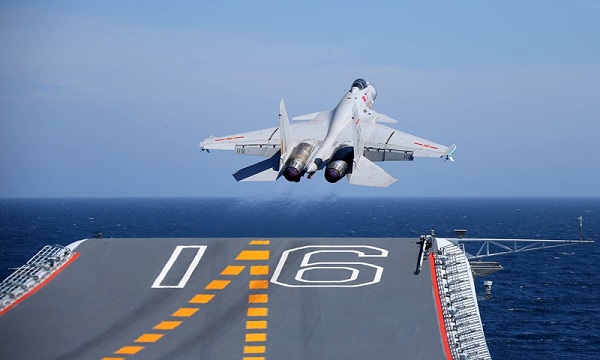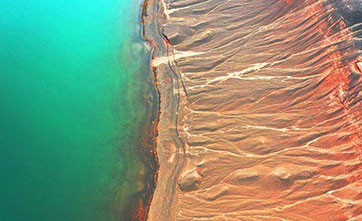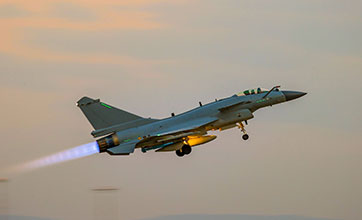PLA carrier, warplanes surround Taiwan in drills, in show of capability to cut off foreign intervention

A J-15 carrier-borne fighter jet takes off from the flight deck of the aircraft carrier Liaoning during a maritime training exercise on July 1, 2017. The Chinese aircraft carrier Liaoning and its carrier strike group carried out realistic training in an undisclosed sea area on July 1, 2017. (eng.chinamil.com.cn/Photo by Li Tang)
A Chinese People's Liberation Army (PLA) aircraft carrier task group was training in the east of Taiwan island as at least 10 PLA warplanes appeared in the west of the island in a routine exercise on Monday, indicating that the island is surrounded from the east with an aircraft carrier task group and by land-based PLA forces on the west.
Chinese mainland analysts said on Tuesday that this tactic can isolate the island's forces from foreign intervention and break Taiwan secessionists' illusion that US or Japanese forces could come to their aid if circumstances arise.
More PLA forces, including a second aircraft carrier and amphibious assault ships, could participate in similar exercises in the future, they predicted.
Some 10 PLA aircraft, namely four J-16 and four J-10 fighter jets, a Y-8 anti-submarine warfare aircraft and a KJ-500 early warning aircraft, entered Taiwan's self-proclaimed southwest air defense identification zone on Monday, the island's defense authorities said in a tweet post, with the illustration attached showing that the Y-8 anti-submarine warfare aircraft flew to the southeast side of the island. Also on Monday, PLA Navy spokesperson Senior Captain Gao Xiucheng announced that the Liaoning aircraft carrier task group was conducting exercises near the island of Taiwan as part of annually scheduled regular training.
The carrier task group passed through waters between Okinawa Island and Miyako Island and sailed south toward the Pacific Ocean on Saturday, Japan's Ministry of Defense Joint Staff said in a press release on Sunday, indicating that the Liaoning was likely training in waters east of Taiwan island.
This means that the island was surrounded by land-based PLA forces including warplanes from the west, and an aircraft carrier task group on the east, analysts said.
"The exercise showed that the PLA is capable of surrounding the island of Taiwan, isolating its troops and leaving them nowhere to run and no chance to win if circumstances arise. Attacking from all directions makes the enemy difficult to defend since they have no idea where the main forces could come from," Shi Hong, executive chief editor of the Chinese mainland magazine Shipborne Weapons, told the Global Times on Tuesday.
Another purpose is to control and seal off foreign intervention when necessary, since the US and Japan could send reinforcements from the east, Shi said, noting that by deploying a carrier task group there, supported by land-based aviation forces and the Rocket Force, the PLA could let these foreign forces fail to meet up with Taiwan secessionists.
The regular exercises by warplanes and warships are deterrents and warnings against Taiwan secessionists and foreign forces that are attempting to interfere in China's internal affairs by sending the wrong signals to Taiwan secessionists, Shi said.
Taiwan secessionists are rampant due to their illusion that countries like the US and Japan will support them if a situation arises, and the PLA is showing that it can not only crack down Taiwan secessionists, but also let foreign interfering forces suffer consequences, Shi said, noting that by cutting off foreign forces, Taiwan secessionists would also lose their psychological support.
Similar exercises will be conducted on a regular basis in the future, the PLA Navy spokesperson said in a statement on Monday.
For future exercises, the PLA could also send the Shandong, China's second aircraft carrier, and the Type 075 amphibious assault ships, together with other destroyers and frigates, Shi said.
Photos
Related Stories
- PLA launches drills in S.China Sea on 20th anniversary of fatal mid-air collision
- Engineer element conducts breaching training
- PLA Army to participate in snowfield competition of int'l army games
- PLA Navy holds consecutive support exercises in S.China Sea; ‘crucial to combat’
- PLA deploys VR tech for more efficient training
- Air force aviation brigade holds flight training under marginal meteorological condition
- PLA commissions new type of infantry fighting vehicle
- Chinese military issues revised regulations on disciplinary inspection
- Solar heating system provides warmth for PLA soldiers in SW China's Tibet
- PLA Eastern Theater Command Air Force holds aerial combat flight
Copyright © 2021 People's Daily Online. All Rights Reserved.










